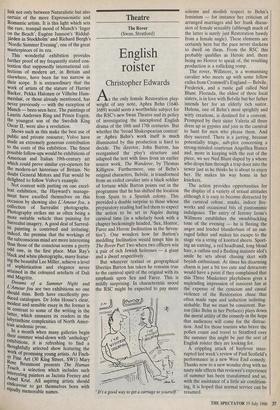Theatre
The Rover (Swan, Stratford)
English roister
Christopher Edwards
s the only female Restoration play- wright of any note, Aphra Behn (1640- 1689) would seem a worthwhile subject for the RSC's new Swan Theatre and its policy of investigating the unexplored English drama of the 16th and 17th centuries. But whether the 'broad Shakespearian context' or Aphra Behn's work itself is much illuminated by this production is hard to decide. The director, John Barton, has reorganised the play's structure and adapted the text with lines from an earlier source work, The Wanderer, by Thomas Killigrew. Furthermore, one of Behn's original characters, Belvile, is transformed from an exiled cavalier into a black soldier of fortune while Barton points out in the programme that he has shifted the location from Spain to a Spanish colony. This provided a double surprise to those whose preparatory reading had led them to expect the action to be set in Naples during carnival time (in a scholarly book with a chapter beckoningly headed, 'Sex, Horror, Farce and Heroic Inclination in the Seven- ties').. One wonders how far Barton's meddling Inclination would tempt him in The Rover Part Two where two officers win a pair of rich Jewish heiresses — a giant and a dwarf respectively.
But whatever textual or geographical liberties Barton has taken he remains true to the carnival spirit of the original with its emphasis upon Sex and Farce. This is mildly surprising. In characteristic mood the RSC might be expected to pay more
A
' It's a good way to get a carriage to yourself.' solemn and modish respect to Behn's feminism — for instance her criticism of arranged marriages and her frank discus- sion of female sexuality (although much of the latter is surely just Restoration bawdy from a female angle). These elements are certainly here but the pace never slackens to dwell on them. From the RSC this probably qualifies as Heroic and, there being no Horror to speak of, the resulting production is a rollicking romp.
The rover, Willmore, is a womanising cavalier who meets up with some fellow exiles from Cromwell's England — Belvile, Frederick, and a rustic gull called Ned Blunt. Florinda, the eldest of three local sisters, is in love with Belvile but her father intends her for an elderly rich suitor. Helena, one of Behn's most sprightly and witty creations, is destined for a convent. Prompted by their sister Valeria all three dress up as gypsies and join in the carnival to hunt for men who please them. And they succeed. There is a jarring, because potentially tragic, sub-plot concerning a strong-minded courtesan Angellica Bianca and, more in keeping with the rest of the piece, we see Ned Blunt duped by a whore who drops him through a trap door into the sewer just as he thinks he is about to enjoy her. He makes his way home in her knickers.
The action provides opportunities for the display of a variety of sexual attitudes although it is easy to become distracted by the carnival colour, masks, indoor fire- works and occasional bits of pantomimic indulgence. The entry of Jeremy Irons's Willmore establishes the swashbuckling tone of the evening — he is fleeing the anger and loaded blunderbuss of an out- raged father and makes his escape to the stage via a string of knotted sheets. Sport- ing an earring, a red headband, long blond hair, a cutlass and a flashing matinee idol's smile he sets about chasing skirt with boyish enthusiasm. At times his disarming charm is just a bit too cute and detractors would have a point if they complained that this Three Musketeer playfulness gives a misleading impression of innocent fun at the expense of the cynicism and casual violence of the Restoration chase that often made rape and seduction indisting- uishable. But we must be consistent. Bar- ton (like Behn in her Prefaces) plays down the moral utility of the comedy in the hope that audiences will come for the distrac- tion. And for those tourists who brave the pollen count and travel to Stratford over the summer this might be just the sort of English roister they are looking for.
A crippling attack of hayfever inter- rupted last week's review of Paul Scofield's performance in a new West End comedy. Thanks now to a new wonder drug with no nasty side effects this reviewer's experience of summer has been transformed and so, with the assistance of a little air condition- ing, it is hoped that normal service can be resumed.


















































 Previous page
Previous page